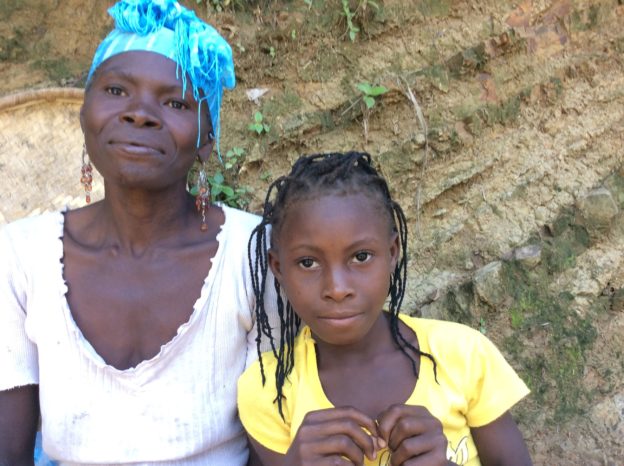Louisimène lives with a daughter in a small shack in Gwo Labou. She has two other children, who live with their fathers. Three of her children are dead.
She grew up in the same extreme poverty that has marked her adult life. Her parents lived in Gran Platon, a mountain community. Her father was never part of her life, and her mother was seriously handicapped, so she was raised by an uncle who treated her well even if he could not send her to school. When she first fell in love, her young partner sent his parents to her uncle to ask for her hand and they set out on their life together. He worked his father’s land, but they were never able to get ahead. They couldn’t earn enough even to buy just a few animals to raise as a source of informal savings.
The situation was especially complicated because her partner always had other women. Eventually, he decided to move to Port au Prince with one of them, abandoning Louisimène and their daughter in Gwo Labou.
Louisimène has tried to send the girl to school, and the girl made it to second grade last year, but she’ll have to repeat the grade because she stopped going when she tore her sneakers and Louisimène couldn’t afford to replace them. The girl’s father doesn’t help. The girl explains, “He never buys anything for me. I could ask her for five gourds (less than eight cents) and won’t give it to me.”
Though their house is in disrepair and the yard that surrounds it is small, Louisimène is careful about its appearance. She sweeps all around it meticulously each day. “Even if you’re poor, when people go by your house, they’ll look at you.”
Louisimène is motivated to try to learn to write her name. She quickly bought the cheap copybook and pencil that Ricot, her case manager, told her to acquire so that he can give her writing lessons. But her progress is slow. The pencil is still awkward in her hand. She struggles even to copy the L’s that Ricot assigns her as homework.
The week’s lesson is about malnutrition, and it starts out oddly. Both Ricot and Louismène seem frustrated that Louismène remembers so little of the previous week’s lesson, and Louisimène’s response is to start by repeating everything Ricot says this week, line by line. He can pause to take a breath without her echoing what he’s just said. It takes some convincing, but he eventually gets her to relax and just listen.
She has a hope for the program, but she initially frames it in very general terms. “Jan nou te ye, nou p ap konsa ankò.” That means that she and her daughter will no longer live the way they’ve been living. When she’s asked to explain, she focuses on her home. “Even if you’re only living under a tree, you have a home,” she says, but her current house is on family land. The land isn’t hers. And she worries that she could die and her daughter could have trouble enforcing her claim to it. So she wants to buy herself a plot.
